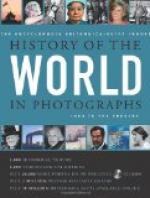and in the discharge of his important duties he greatly
endeared himself to the Irish people. The spirit
in which he acted and the aims which he steadily set
before himself contributed to the allaying of party
animosities, to the promotion of a willing submission
to the laws, to the prosperity of trade and to the
extension and improvement of education. On the
great question of the time his views were opposed
to those of the government. He saw clearly that
the time was come when the relief of the Catholics
from the penal legislation of the past was an indispensable
measure, and in December 1828 he addressed a letter
to the Roman Catholic primate of Ireland distinctly
announcing his view. This led to his recall by
the government, a step sincerely lamented by the Irish.
He pleaded for Catholic emancipation in parliament,
and on the formation of Earl Grey’s administration
in November 1830, he again became lord-lieutenant
of Ireland. The times were changed; the act of
emancipation had been passed, and the task of viceroy
in his second tenure of office was to resist the agitation
for repeal of the union carried on by O’Connell.
He felt it his duty now to demand Coercion Acts for
the security of the public peace; his popularity was
diminished, differences appeared in the cabinet on
the difficult subject, and in July 1833 the ministry
resigned. To the marquess of Anglesey Ireland
is indebted for the board of education, the origination
of which may perhaps be reckoned as the most memorable
act of his viceroyalty. For thirteen years after
his retirement he remained out of office, and took
little part in the affairs of government. He
joined the Russell administration in July 1846 as
master-general of the ordnance, finally retiring with
his chief in March 1852. His promotion in the
army was completed by his advancement to the rank
of field-marshal in 1846. Four years before, he
exchanged his colonelcy of the 7th Light Dragoons
which he had held over forty years, for that of the
Royal Horse Guards. He died on the 29th of April
1854.
The marquess had a large family by each of his two
wives, two sons and six daughters by the first and
six sons and four daughters by the second. His
eldest son, Henry, succeeded him in the marquessate;
but the title passed rapidly in succession to the 3rd,
4th and 5th marquesses. The latter, whose extravagances
were notorious, died in 1905, when the title passed
to his cousin.
Other members of the Paget family distinguished themselves
in the army and the navy. Of the first marquess’s
brothers one, SIR CHARLES PAGET (1778-1839), rose
to the rank of vice-admiral in the Royal Navy; another,
General SIR EDWARD PAGET (1775-1849), won great distinction
by his skilful and resolute handling of a division
at Corunna, and from 1822 to 1825 was commander-in-chief
in India. One of the marquess’s sons by
his second marriage, LORD CLARENCE EDWARD PAGET (1811-1895),
became an admiral; another, LORD GEORGE AUGUSTUS FREDERICK
PAGET (1818-1880), led the 4th Light Dragoons in the
charge of the Light Brigade at Balaklava, and subsequently
commanded the brigade, and, for a short time, the
cavalry division in the Crimea. In 1865 he was
made inspector-general of cavalry, in 1871 lieutenant-general
and K.C.B., and in 1877 full general. His Crimean
journals were published in 1881.




